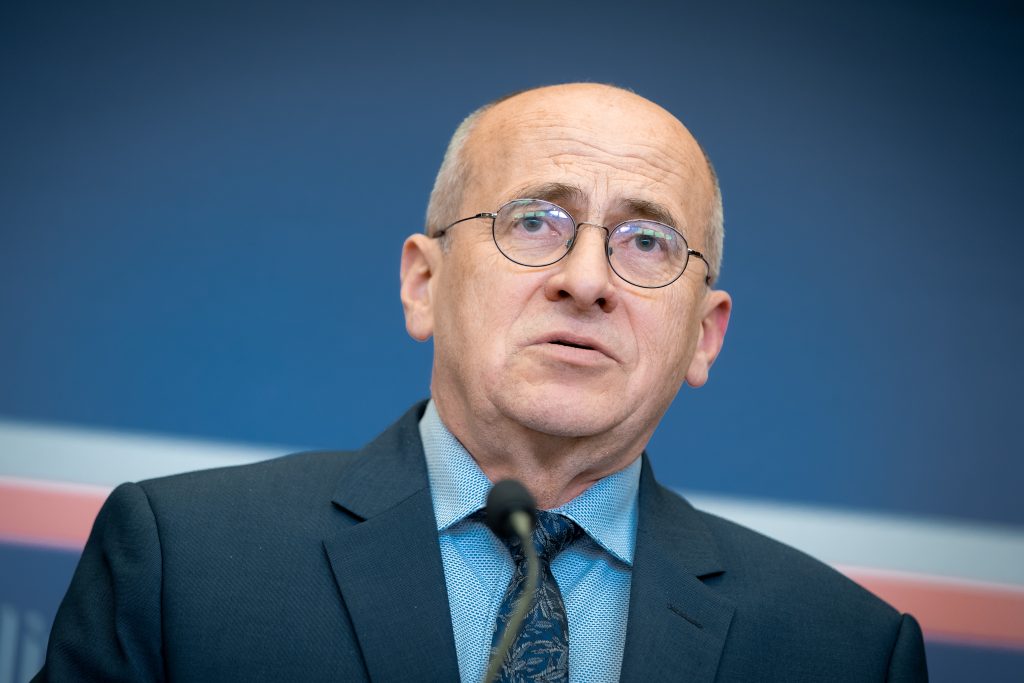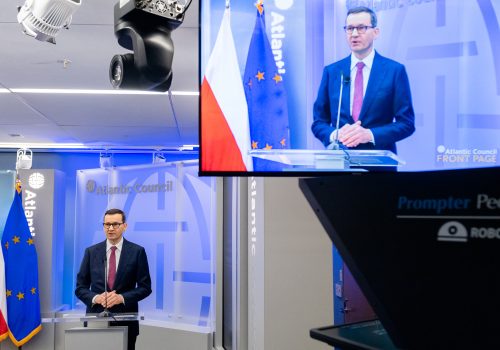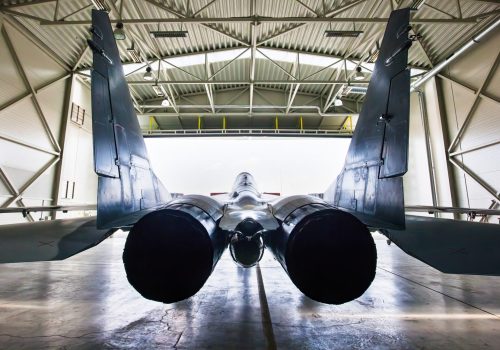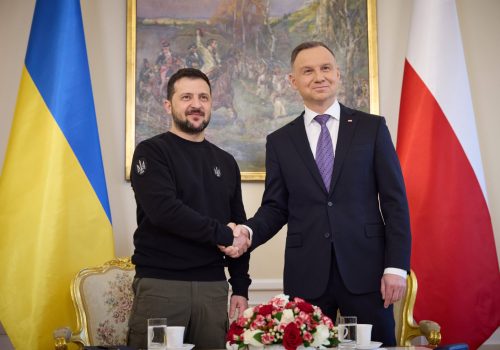Poland stands on the frontier of war. Its international profile and potential weight have grown due to its leadership in support of Ukraine and its prescience in warning of Russia’s revanchist intentions. So when its government delivers a formal and comprehensive foreign policy statement, as Polish Foreign Minister Zbigniew Rau did in presenting his “Exposé” to the Polish parliament last month, it’s worth a close look.
Poland has seen transformational success and rapid economic growth led by a series of governments—liberal, rightist, social democratic, and odd coalitions—since overthrowing communist rule in 1989. Poland is thus poised to emerge as an agenda setter in Europe and critical ally of the United States in the face of a hostile and dangerous Russia. Poland’s domestic politics—divisive and likely to get more ugly ahead of this fall’s elections, in which the Law and Justice Party faces a challenge to its eight-year run in power—could complicate its position. Partisanship is hot in Poland, with the opposition (the liberal Civic Platform, Peasants’ Party, Poland 2050, and other parties) calling these elections a decisive moment for Polish democracy. But, with some notable exceptions, Rau’s statement of Polish foreign policy is likely to stand, whatever the results of the election.
Rau put Russia’s war against Ukraine at the center of Poland’s strategy and generalized the challenge, contrasting Russian President Vladimir Putin’s war of aggression with a rules-based international order that rejects great-power domination in favor of shared values. Rau cast the former as “imperialism,” seemingly with the Global South in mind, given Rau’s outreach to that part of the world. Poland’s relations abroad, Rau made explicit, will reflect its partners’ attitude toward (and actions to counter) Russia’s attack on Ukraine. Poland, Rau emphasized, is committed to “a true free world coalition” that can defend itself and to that end will devote a minimum of 3 percent of its gross domestic product to defense, including 4 percent this year.
Unsurprisingly, Rau gave pride of place to Polish-US relations, stressing the United States’ role as natural leader of the free world and a European power, emphasizing bilateral security and military relations but also lauding US investment, including in nuclear energy. He was enthusiastic about Polish-UK relations and emphasized the positive in Polish-French relations. Rau was enthusiastic about NATO’s role and mission to defend allied territory from attack and, again unsurprisingly, urged NATO to “denounce” the 1997 NATO-Russia Founding Act that included unilateral NATO limitations on new stationing of substantial combat forces on the territory of NATO members.
Finding its place in Europe
Some elements of Rau’s “Exposé” covered trickier issues or striking elements. For example, Rau accurately noted “overwhelming” Polish commitment—within society and across the divided Polish political spectrum—for its continued European Union (EU) membership. That means no push for a PolExit or explicit expression of Euroskepticism, notwithstanding some support for that outlook within some parts of the Polish right, which is the Law and Justice Party’s base. However, he did not emphasize what the EU has done for Europe and Poland, i.e., bring peace after centuries of European wars and serve as the instrument for bringing Poland into core Europe rather than remaining on its periphery. Without referring directly to the heated dispute between Poland and the EU over charges that the government has politicized Poland’s judiciary (he simply notes “temporary twists and turns” in Polish-EU relations), Rau made clear Poland’s view that the EU is an association of sovereign nations and that Poland supports the principle of EU unanimity in decision making and not the existing practice of “qualified majority” voting on some issues.
Rau’s assessment of the EU, while positive, lacked a full appreciation of what Poland gains from its EU membership materially and strategically. A liberal-led Polish government, if one emerges from this fall’s elections, would almost certainly seek to settle the Polish-EU dispute over the judiciary (thus restoring thirty-five billion euros in withheld EU pandemic recovery funds) and would probably be more definitive about the massive benefits Poland gains from EU membership.
In a justified “we told you so” section, Rau reviewed Russia’s threatening language and actions, starting with Putin’s diatribe at the 2007 Munich Security Conference and Poland’s warnings about it at the time. He urged the international community to keep Russia “beyond the community of civilized nations” until its aggression against Ukraine ends. At the same time, and in contrast to the views of many Poles and others in Eastern Europe with direct experience of Russia’s brutality, Rau noted Russia’s democratic potential: “It can be the Russia of Andrei Sakharov and Anna Politkovskaya,” recalling the liberal-minded nuclear scientist turned democracy activist and the murdered Russian journalist. Such a Russia, Rau qualified, is possible only after Russia withdraws from Ukraine and gives up its imperial pretentions. It is striking, nevertheless, that a Polish foreign minister in a formal statement does not rule out a better relationship with a future, better Russia. This characterization skillfully sets up Poland to be a leader as Europe builds its longer-term future with Russia.
In a powerful section, Rau advocated Ukraine’s EU and NATO accession “as soon as possible… because it is in Poland’s most vital, existential interest.” He explained that the long, complicated Polish-Ukrainian history could lead to “considerable frictions,” but history shows that their quarrels benefit only Moscow. Rau advocated “permanent cooperation” between Poland and Ukraine—implicitly recalling the best republican and multi-national traditions of the old Polish-Lithuanian Commonwealth that included most of present-day Ukraine. Rau’s approach rests on decades of Polish rethinking about Ukraine, including a largely successful effort to turn aside nationalist narratives; importantly, this view is shared across the Polish government and within most of the political opposition, excepting only the hard right.
Given its rightist government, many in Western Europe and the United States have casually associated Poland with Hungary, led by the nationalist Prime Minister Victor Orbán. This association was often exaggerated by outsiders, and it fell apart after Putin opened full-scale war against Ukraine. In contrast to Poland, Orbán’s Hungary has pursued a more ethnic-nationalist agenda with Ukraine, flirting with territorial irredentism as officials bemoan the loss of prior Hungarian territory after 1918 and display maps of Greater Hungary. Orbán often seems to make common cause with Moscow even while accepting most EU sanctions against Russia. Rau’s remarks included a sharp break with Hungary, noting their “fundamentally different” perceptions of Russia’s aggression against Ukraine, a divergence that “concerns the vital interests of Poland and Europe as a whole.” For Poland, strategic divergence over Ukraine trumps some ideological compatibility. Rau also emphasized Poland’s “strategic relations” with Romania (with which Hungary has had difficulties) given their shared views about security on Europe’s eastern flank. Romania has long sought closer relations with Poland given their similar views of Putin’s Russia; this may now be at hand.
The German conundrum
Polish-German relations are encumbered by history, significant differences over Russia, Poles’ concern that Germany might not stand up for them should Russia turn on Poland, and Polish election-year politics. In discussing Germany, Rau walked a difficult line, addressing the differences while affirming that Poland needs Germany and gains from their alliance. Rau acknowledged the positives but went straight away to the substantively strongest Polish complaint: For decades, Germany was mistaken about the nature of Russia’s threat to Europe and “would ignore our warnings.” That is true, and it wasn’t just Polish warnings that German governments would dismiss. While serving in the US government, one of the authors often cautioned his German interlocutors about Putin’s aggressive ambitions, with mixed results.
Rau welcomed the German government’s acknowledgment that its Russia policy had been mistaken and praised German Chancellor Olaf Scholz for his “Zeitenwende” speech of February 2022 proclaiming a strategic shift in Germany’s view of Russia. But instead of focusing on (and pocketing) that strategic shift or offering to work with Germany to develop a common approach on Russia, Rau went on to note three areas where Poland sought changes in German policy.
Firstly, Rau urged Germany to support NATO renouncing the NATO-Russia Founding Act on the grounds that it includes restrictions on the stationing of NATO forces. Indeed, given Russia’s war against Ukraine, the Founding Act no longer reflects the reality of NATO-Russia relations and NATO would be on solid ground (and well-advised) to suspend or renounce it, pending a satisfactory settlement of the war in Ukraine and change in Russia’s general belligerence. This is a reasonable and relatively easy request for Warsaw to make of Berlin.
Secondly, and more problematically, Rau said that a “debt owed by Germany” for its attack on and occupation of Poland during World War II is a “dramatic burden on our mutual relations.” He noted, with strong basis, that Germany’s post-World War II sense of responsibility and guilt had focused on Russia but not on Ukraine, Poland, Belarus, or other nations that arguably had suffered more. Given that Germany has rejected the Polish government’s request for compensation, Rau concluded, a Polish-German problem will persist.
Rau has a historical case, but the potential for impasse is high; the issue could fuel nationalist sentiment in both countries. Exploiting anti-German sentiment in this year’s political campaign risks locking in a Polish-German dispute in ways that could damage all parties. However, one leading Polish foreign policy strategist close to the government, Slawomir Debski, head of the Polish Institute for International Affairs, has hinted at a way forward. Writing in Politico last fall, Debski defended the Polish position but then suggested that the “details” of a resolution could involve something other than simply monetary reparations, such as an education fund or endowment to help retrieve Polish art and other looted items of cultural heritage. In concept, such funds could apply to countries beyond Poland that suffered at the hands of Nazi Germany such as Ukraine. Given the heat of the Polish election campaign, the time is not ripe to explore creative approaches. But that time may come, and something like what Debski suggests may help.
Thirdly, using strong language, Rau expressed skepticism about Germany taking a leading role in the continent: “Europe does not need Germany’s leadership.” At the same time, Rau made clear that he meant especially Germany’s efforts to expand qualified majority voting in the EU that could weaken Poland’s position. This contrasts with the position of previous, liberal Polish governments that sometimes urged Germany to assume more leadership, especially in opposing Russia’s aggressive designs.
Taking the lead
Rau’s “Exposé” presents a compelling strategic vision for his country, including commitment to a rules-based international order and a free world to defend it; enduring alliance with the United States; resistance to Russia’s aggression; support for Ukraine in its war of survival and its full integration with the EU; and, with qualifications, affirmation of Poland’s European future. Building on a generation of successful development at home and integration with Europe and NATO after overthrowing communist rule in 1989, Poland has its best chance in centuries to assume an influential, even leadership role.
That European and transatlantic leadership potential can be compromised, however, if differences with the EU remain persistent and especially if tensions with Germany are locked in to create lasting chilliness. Germany seems to be in a rare moment of strategic flexibility, traumatized by the collapse of its prior assumptions about Russia and, finally, moving in the direction Poland has long advocated—European security not with Russia but against Russia, to use a powerful and apt phrase German officials are now using. Poland should take advantage of the potential to work with (and perhaps push) Germany to build a common Russia policy for Europe. The Germans may be ready and, for their part, should be eager to work with the Poles to this end. In the meantime, and probably through Poland’s elections this October, the reality of Polish-German economic and military cooperation may help stabilize their relations until a way through or around current difficulties can be found, as it needs to be.
During communist rule, Poland’s democratic dissidents of all political complexions stressed that Poland belonged in an undivided Europe and the Western alliance. After coming to power after 1989, they helped make this vision real by pushing, successfully, for NATO and the EU to open their doors to Poland and Europe’s other newly free nations. As Russia wages war against Ukraine, Poland still stands, rightly, for expanding the frontiers of freedom in Europe. Hopefully, it can build on past success to achieve that worthy goal.
Daniel Fried is the Weiser family distinguished fellow at the Atlantic Council. He previously served as US ambassador to Poland and assistant secretary of state for Europe.
Aaron Korewa is the director of the Atlantic Council’s Warsaw Office, which is part of the Europe Center.
Further reading
Fri, Apr 14, 2023
Poland’s prime minister: Western Europe needs to commit to Ukrainian victory and beware of China
New Atlanticist By Katherine Golden
The prime minister explained that the US-Poland bond is key to strengthening the transatlantic community's deterrent power.
Thu, Mar 16, 2023
Poland defies Putin with landmark decision to give Ukraine fighter jets
UkraineAlert By Peter Dickinson
Poland is set to become the first Western nation to supply Ukraine with fighter jets, Polish President Andrzej Duda has confirmed. Duda said Ukraine would receive four Polish Soviet-era MiG-29 jets “in the next few days.”
Wed, Apr 12, 2023
Poland and Ukraine: The emerging alliance that could reshape Europe
UkraineAlert By
Poland's leading role in the European response to Russia's Ukraine invasion is fueling talk of a eastward shift in Europe's geopolitical center of gravity with the Polish-Ukrainian alliance set to become increasingly influential.
Image: Polish Foreign Minister Zbigniew Rau attends a joint news conference with French Foreign Minister Catherine Colonna at the ministry in Warsaw, Poland on May 31, 2022.



